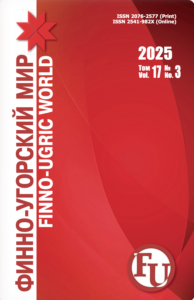DOI: 10.15507/2076-2577.010.2018.02.037-047
Variance of phraseological units in the Moksha and Russian languages (typological analysis)
Valentina F. Rogozhina,
Candidate Sc. {Philology}, Associate Professor, Department of Mordovian Languages, Ogarev Mordovia State University
(Saransk, Russia), valentina-141966@mail.ru
Nadezhda A. Kulakova,
Candidate Sc. {Philology}, Associate Professor, Department of Mordovian Languages, Ogarev Mordovia State University
(Saransk, Russia), nad_kul@rambler.ru
The article analyses the typology of variants of phraseological units in unrelated languages – Moksha and Russian. The aim of the work is a typological analysis of the variability of phraseological units in these languages. The subject of the study are the variants of phraseological units in these languages. The ideas of this research can be used for academic and research materials for such courses as “Modern Moksha language”, “Comparative grammar of the Mordovian and Russian languages”.
The research methodology is based on a system approach that incorporates comparative and typological as well as structural and grammatical methods. The article is rooted in research of Russian and Finno-Ugric linguistic data of phraseological dictionaries, fiction works, and the recordings of the dialects of native speakers of these languages.
Formal variation of phraseological units does not cause fundamental differences, whereas lexical replacement of components generates different opinions. Most linguists determine the variability of phraseological units as changes of the form of phraseological units and their expression.
It is concluded that phraseological units of the Moksha and Russian languages contain lexical and morphological variability. Lexical variation is expressed by means of different lexical components. In the compared languages, predicative phraseological units containing more than two components are most prone to contractions. Morphological variability is expressed in changing grammatical form. In Russian it is expressed in number, cases and sometimes in the gender, while in Moksha it is expressed in the use of postpositions.
Key words: glossary; grammar; phraseological unit; bilingual dictionary; lexical variance; morphological variability; noun; adjective; pronoun; suffix; Moksha language; Russian language.
For citation: Kulakova NA, Rogozhina VF. Variance of phraseological units in the Moksha and Russian languages (typological analysis). Finno-ugorskii mir = Finno-Ugric World. 2018; 2: 37–47. (In Russian)






















